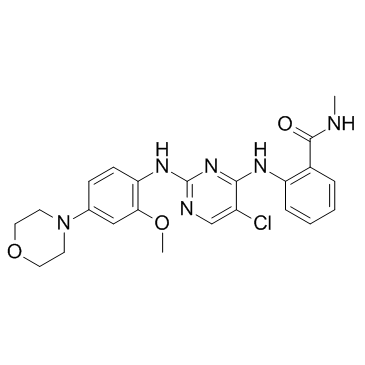
TAE226
CAS No. 761437-28-9
TAE226 ( NVP-TAE226 )
Catalog No. M15890 CAS No. 761437-28-9
NVP-TAE226 is a potent FAK inhibitor with IC50 of 5.5 nM and modestly potent to Pyk2(IC50=3.5 nM); 10- to 100-fold less potent against InsR, IGF-1R, ALK, and c-Met.
Purity : >98% (HPLC)
 COA
COA
 Datasheet
Datasheet
 HNMR
HNMR
 HPLC
HPLC
 MSDS
MSDS
 Handing Instructions
Handing Instructions
| Size | Price / USD | Stock | Quantity |
| 2MG | 51 | In Stock |


|
| 5MG | 93 | In Stock |


|
| 10MG | 149 | In Stock |


|
| 25MG | 249 | In Stock |


|
| 50MG | 357 | In Stock |


|
| 100MG | 537 | In Stock |


|
| 200MG | Get Quote | In Stock |


|
| 500MG | Get Quote | In Stock |


|
| 1G | Get Quote | In Stock |


|
Biological Information
-
Product NameTAE226
-
NoteResearch use only, not for human use.
-
Brief DescriptionNVP-TAE226 is a potent FAK inhibitor with IC50 of 5.5 nM and modestly potent to Pyk2(IC50=3.5 nM); 10- to 100-fold less potent against InsR, IGF-1R, ALK, and c-Met.
-
DescriptionNVP-TAE226 is a potent FAK inhibitor with IC50 of 5.5 nM and modestly potent to Pyk2(IC50=3.5 nM); 10- to 100-fold less potent against InsR, IGF-1R, ALK, and c-Met.(In Vitro):NVP-TAE 226 (TAE226), a potent ATP-competitive inhibitor of several tyrosine protein kinases, in particular FAK and IGF-IR kinases. In a cell-based kinase assays, FAK, IGF-IR kinase, and IR kinase are inhibited with an IC50 range of 100 to 300 nM compared with the other kinases tested, which are >10-fold less sensitive. In culture, NVP-TAE 226 inhibits extracellular matrix-induced autophosphorylation of FAK (Tyr395). NVP-TAE 226 also inhibits IGF-I-induced phosphorylation of IGF-IR and activity of its downstream target genes such as MAPK and Akt. NVP-TAE 226 retards tumor cell growth as assessed by a cell viability assay and attenuates G2-M cell cycle progression associated with a decrease in cyclin B1 and phosphorylated cdc2 (Tyr15) protein expression. NVP-TAE 226 treatment inhibits tumor cell invasion by at least 50% compared with the control in an in vitro Matrigel invasion assay. Interestingly, TAE226 treatment of tumor cells containing wild-type p53 mainly exhibits G2-M arrest, whereas tumor cells bearing mutant p53 underwent apoptosis.(In Vivo):Treatment with NVP-TAE 226 (TAE226) at 50 or 75 mg/kg extends the median survival of U87 xenograft animals by 6 and 7 days, respectively (P=0.084 and P=0.042, respectively, compared with vehicle-treated animals). However, NVP-TAE 226 treatment of LN229-engrafted animals significantly prolongs their median survival by 19 days (P<0.004 for both dosages, compared with vehicle-treated animals).
-
In Vitro——
-
In Vivo——
-
SynonymsNVP-TAE226
-
PathwayAngiogenesis
-
Targetc-Met/HGFR
-
Recptorc-Met| FAK| IGF-1R| Insulin Receptor| PYK2
-
Research AreaCancer
-
Indication——
Chemical Information
-
CAS Number761437-28-9
-
Formula Weight468.94
-
Molecular FormulaC23H25ClN6O3
-
Purity>98% (HPLC)
-
SolubilityDMSO: 94 mg/mL (200.45 mM)
-
SMILESO=C(NC)C1=CC=CC=C1NC2=NC(NC3=CC=C(N4CCOCC4)C=C3OC)=NC=C2Cl
-
Chemical Name2-((5-chloro-2-((2-methoxy-4-morpholinophenyl)amino)pyrimidin-4-yl)amino)-N-methylbenzamide
Shipping & Storage Information
-
Storage(-20℃)
-
ShippingWith Ice Pack
-
Stability≥ 2 years
Reference
1.Liu TJ, et al. Mol Y Ther, 2007, 6(4), 1357-1367.
molnova catalog



related products
-
Onartuzumab
Onartuzumab (MetMAb) is a humanized anti-tyrosine kinase c-MET monovalent monoclonal antibody.
-
Usnic Acid
Usnic acid is an antimicrobial, antitumor and enzyme inhibiting agent shown to uncouple oxidative phosphorylation in mouse-liver mitochondria.
-
Amivantamab
Amivantamab (JNJ-61186372) is a humanized antibody that recognizes epidermal growth factor receptor (EGFR) and MET proto-oncogene (MET).



 Cart
Cart
 sales@molnova.com
sales@molnova.com


